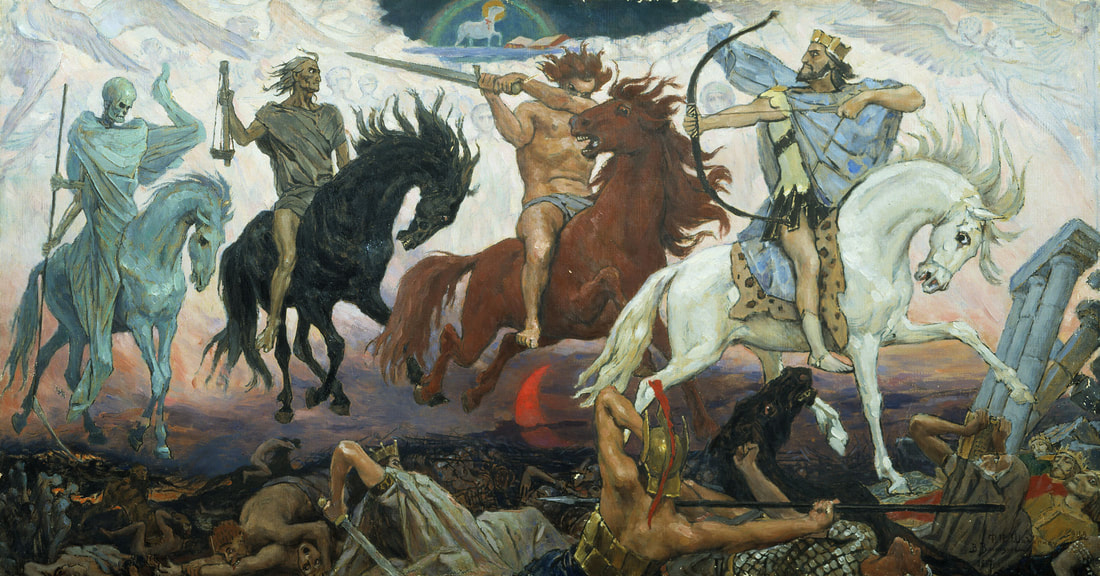|
The One who thrones holds in His hand a scroll with seven seals, a scroll which no one is worthy to open. No one, save the seven-eyed Lamb which has been slaughtered. The Lamb takes the scrolls from the One and begins to break its seals. As the Lamb takes it, the elders begin worshiping the Lamb, as they have seen that the Lamb is worthy as the One who thrones is worthy. The Lamb, of course, is the Son, the spoken Word of the Father, who acts in the world. The Father does not open the scroll, for the Father is hidden. It’s the Son who reveals the Father to us who opens the scroll. And with every seal that is broken, a new event occurs. With each of the first four seals come the four horsemen: Conquest, War, Famine, and Death. As Guardini notes, it’s impossible to interpret these four horsemen independently as the symbols overlap. The final horseman, for example, is Death. Though War and Famine both carry death with them as well, just as war carries famine with it. The curious thing about the horsemen is that all four are not merely things to come at the end of time, but are things already here. “On the contrary, the apocalyptical riders symbolize recurrent aspects of earth’s existence, characteristics of world-evolution with the incidents that mark it. They do not gallop that one ultimate hour through history, but again and again. Whenever certain events take place, it is they, the horsemen, who ride over the world . . . They are the first ripples of the ultimate flood, announcements of the coming God-sent catastrophe in which everything sinful, false and degenerate in man will be laid bare.” -Romano Guardini ("The Lord") This is clear enough from the opening of the fifth seal, in which we see the souls of the righteous crying out from under the altar for God’s justice to fall and reign supreme. The souls are told to wait awhile longer, until the measure of God’s patience is full. The horsemen are not merely released once that measure is full, but are already among us, their power felt again and again throughout the ebb and flow of history, while the righteous await the ultimate flood of Divine justice. It’s the opening of the sixth seal which backs this up further, as it is when this sixth seal is opened that the earth begins to quake, the moon turns to blood, the stars begin falling out of the sky, the sky itself vanishes, and everyone remaining on earth hides from the Judge who comes—from God’s wrath. The horsemen are indeed apocalyptical, inasmuch as they are the “first ripples of the ultimate flood.” It is the sixth seal which seems to mark the measure being full, and God’s justice reigning down upon the world. The question obviously comes up, though: Why does the end need to be so terrible? Why all the dread? The simple answer is “sin,” but that needs some expounding. Nothing that exists does so apart from God. Everything was begun by His hand. As such, there is no such thing as a “natural end” to the world. The world will end when God so chooses it to end, and by the manner He so chooses. But the world is filled with sin, and all of us in it. “And because sin has heaped up such a terrible balance, which it continues to pile higher and higher, that end will be necessarily dreadful: utter destruction and judgment.” That is, God’s patience with the sin we continue to commit, though the four horsemen stride among us giving us a foretaste of the full consequences to come, will eventually be full. At that time, it will no longer be the horsemen, but the Lamb who returns to the world as Divine Judge. Until such time, the righteous are told to wait. “Be patient, even though nothing seems to happen! Do not be deceived by God’s silence! God is silent, and men think their power assured. In reality its limits have long been set. Injustice steadily increases; when in God’s eyes the measure is full, vengeance will come. The menace of this supreme chastisement flashes ‘apocalyptically’ in every scene of general violence, regardless of place or hour.” -Romano Guardini ("The Lord") And so we wait, and continue to suffer for the name of God. We continue to adore Him, to pray and worship, as the world rejects Him and moves further and further from the Light. But one day, by His grace, we will wash our robes in the blood of the Lamb and worship before the throne, where there is no more famine nor war nor death. “For the Lamb at the center of the throne will be their shepherd, and he will guide them to springs of the water of life, and God will wipe away every tear from their eyes” (Revelation 7:17).
0 Comments
|
Series Info
Every day of Lent, I am writing a reflection piece on two chapters of "The Lord" by Romano Guardini. If you'd like to read or follow along, you can find the full calendar of where we're at below, or Click Here for the main landing page. Archives
April 2020
Categories
All
|

 RSS Feed
RSS Feed